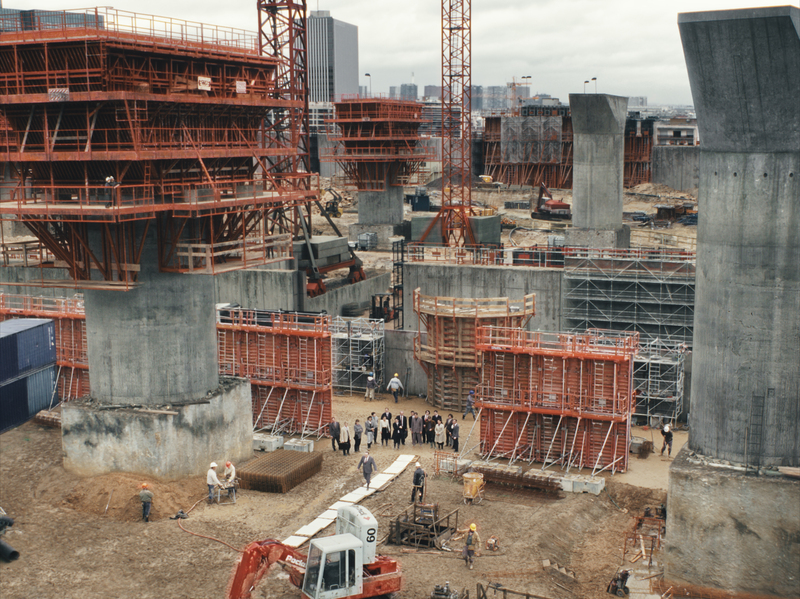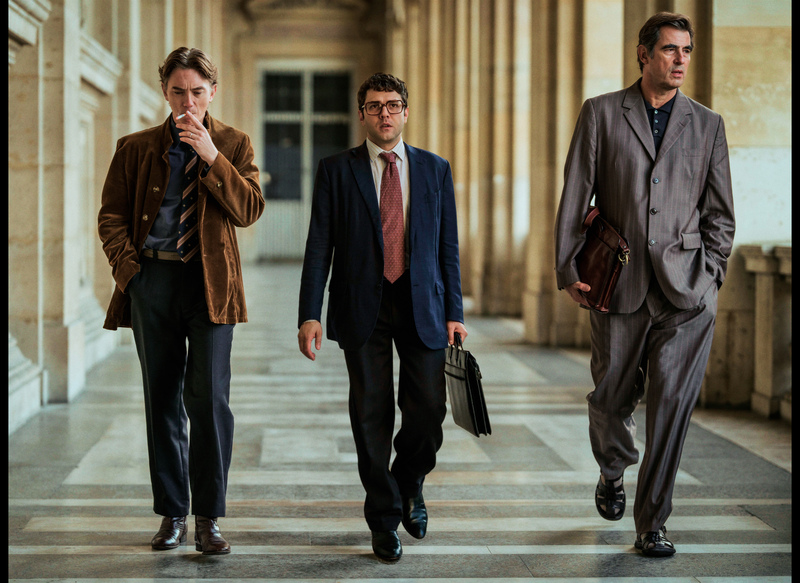Cannes 2025 Review: Biopic THE GREAT ARCH, Measured Study of Vision and Compromise
Claes Bang stars. Stéphane Demoustier crafts a restrained biopic that charts the fraught realisation of France's Grande Arche de la Défense.
 2025 AGAT FILMS LE PACTE-thumb-860xauto-98606.jpg)
The pathos and anticipation are punctuated by a charged silence in the opening scene of Stéphane Demoustier’s new feature The Great Arch, which traces the origins of France’s Grande Arche de la Défense.
Gathered around French President François Mitterrand (Michel Fau), a group of officials and dignitaries await the unveiling of the design for a new architectural work set to alter the Parisian skyline along the Axe historique, which connects the Arc de Triomphe, the Champs-Élysées, and the Luxor Obelisk at the Place de la Concorde.
When the name Johan Otto von Spreckelsen (Claes Bang) is announced, no one present knows who he is. Even the French Embassy in Denmark is unable to provide any information. Mitterrand’s close aide and technocrat Jean-Louis Subilon (Xavier Dolan) eventually tracks him down, finding him naked in a lake, fishing while his wife sits in a nearby boat.
Spreckelsen is brought to Paris with his wife for a round of celebrations, public relations events, and preparatory work on the project. When a journalist asks what he has built to date, he replies, “my house and four churches,” a disarming answer that wins over the local press and public.
Almost overnight, Spreckelsen becomes the unlikely chief designer of France’s Grande Arche, his proposal having secured unanimous approval over those of French architects. The film follows his effort to realise what he calls his "life’s work," as his singular vision and idealism collide with political ambition, practical constraints, and shifting ideological currents in 1980s France.
Demoustier’s film is a biopic loosely based on Laurence Cossé’s book, following the protagonist from his unexpected victory in an international design competition through the fraught process of realizing a grand architectural vision amid bureaucracy, budget constraints, and shifting political will.
The Great Arch belongs to the tradition of portraits of artists consumed by their vision, though Demoustier frames it as an underdog story. The protagonist, a foreigner in France, must fight to defend his design, driven by artistic ambition and a sense of loyalty to his client.
The film examines the limits imposed by external forces on acts of public creation. In doing so, Demoustier foregrounds not the triumph of vision, but the personal cost of its pursuit.
The story unfolds across a series of structured episodes that reflect the stages of an architectural project, from the initial competition and conceptualization to mounting tensions, compromises, and the final, bittersweet completion. The narrative is told from the perspective of the protagonist, who, after an early period of euphoria, finds himself facing an increasingly uphill battle to protect his vision.
After accommodating Mitterrand’s wishes for a bold addition to the Parisian skyline, Spreckelsen not only provides the vision and blueprint but remains directly involved in the construction process, selecting materials to realise his radical design. At this point, the obstacles of bringing such a monumental project to life begin to weigh on him.
Spreckelsen develops a complex, love-hate relationship with French architect Paul Andreu (Swann Arlaud), whom he appoints as project manager. While Andreu respects and admires Spreckelsen’s vision, he is equally determined to see the building completed, even if that requires compromises along the way.
Bang portrays Spreckelsen as a charming and composed artist, largely free of eccentricities, yet unwilling to compromise and increasingly unsettled when confronted with resistance to some of the costly elements of his radical vision. His grip on the project begins to falter as his refusal to make concessions creates growing tension not only with collaborators but also with his wife. Liv von Spreckelsen (Sidse Babett Knudsen) is portrayed as both his personal support and his fixer, managing contracts, finances, and often mediating on his behalf.
The protagonist’s unraveling is underscored by a rupture in their relationship, which forces him to reconsider his commitment to the project. The film includes a disclaimer noting that Liv is a fictional character (Spreckelsen’s actual wife was Karen Gerda Gustavsen), introduced for dramatic purposes to frame the protagonist’s otherwise restrained breakdown and a rare outburst of anger. Her presence in the narrative carries added weight in a story otherwise dominated by male figures.
The Great Arch employs a 1.37 aspect ratio to echo Spreckelsen’s obsessive pursuit of geometric perfection. Cinematographer David Chambille, a frequent collaborator of Bruno Dumont (Empire), shot the film using a restrained color palette and soft focus to evoke the period.
The building remains a constant presence, whether through ongoing discussions, architectural models, or the colossal construction site that Spreckelsen oversees. While the Élysée Palace frames the film’s narrative, as key decisions are made there, the construction site becomes the true arena of Spreckelsen’s efforts and, in a scene of operatic intensity, his undoing.
The Great Arch examines the fragile nature of idealism in the face of political and economic shifts, seen through the eyes of an idealistic outsider. François Mitterrand’s presidency, initially marked by socialist ambition, serves as the backdrop for the gradual rise of neoliberal austerity, which ultimately undermines both the project and its architect’s resolve.
Despite the material, Demoustier avoids melodrama, pathos, or excess. The emotional tone remains restrained, shaped by a deliberately economical approach that mirrors the protagonist’s own composed nature. Spreckelsen keeps his emotions contained until the point where restraint can no longer hold.
The Great Arch
Director(s)
- Stéphane Demoustier
Writer(s)
- Laurence Cossé
- Stéphane Demoustier
Cast
- Sidse Babett Knudsen
- Claes Bang
- Xavier Dolan









